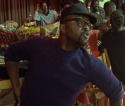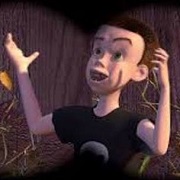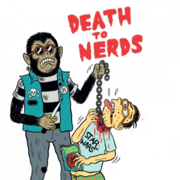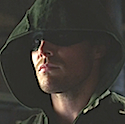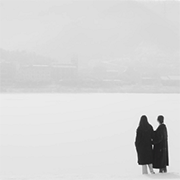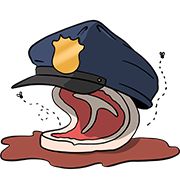|
Vegetable posted:Death of the author doesn’t mean ignore the author you dummy. It just means don’t treat the author as the word of god. You just called the author's stated intentions nothing more than "a bit of fun trivia." You were saying people should ignore the author. Also, that's a really oversimplified understanding of Barthes' writing. "Death of the Author" is about radically rethinking what we consider authorship and authority. You're using the term to refer to the Intentional Fallacy.
|
|
|
|

|
| # ? May 19, 2024 00:46 |
|
'Death of the Author' was a suggestion, not a divine command.
|
|
|
|
Guess we're all waiting for Barthes to tell us exactly what he meant by "death of the author" so we finally know who's right and who's wrong.
|
|
|
|
SuperMechagodzilla posted:Again, the trap is to be like “oh they are rude and crude people. This is obvious criticism!!!”, when that actually has little to do with the profession itself. Like, if I were to make a story about truckers and they were depicted as swearing and, I dunno, smoking cigarettes - who’d care? This is one of those "boss baby vibes" type things. Like, have you seen the first fifteen minutes of THEY LIVE? The political sophistication would completely blow your mind if these are the expectations. YggdrasilTM posted:What does the movie actually say? Not a single drat thing.
|
|
|
|
Open Source Idiom posted:Guess we're all waiting for Barthes to tell us exactly what he meant by "death of the author" so we finally know who's right and who's wrong. this got a sensible chuckle from me YggdrasilTM posted:What does the movie actually say? don't steal gas in north carolina
|
|
|
|
Open Source Idiom posted:Guess we're all waiting for Barthes to tell us exactly what he meant by "death of the author" so we finally know who's right and who's wrong.  Alas, he is for reals dead. Ghost Leviathan posted:'Death of the Author' was a suggestion, not a divine command. It's obviously not a divine command, but aside from the fact that you can take any interpretive lens as just a suggestion, Barthes's language is pretty imperative: "the birth of the reader must be at the cost of the death of the author" (my emphasis). And it's important to understand that Barthes' point is more broadly about reconsidering the idea of authorship and authority, not just whether or not one should consider authors' stated intentions. The essay begins with an argument that our idea of the author is a relatively recent Western concept that was born out of English empiricism and French rationalism and reified by capitalism. It's a short and interesting essay that I PeterWeller fucked around with this message at 19:38 on May 3, 2024 |
|
|
|
Also, if the author intent has no relevance at all, then let's go by committee and focus group and all that stuff.
|
|
|
|
If the author's intent is paramount then you can't look at cave art and say anything about it because you literally have no idea what it means, what they were trying to do, how their society was structured, anything. It's basically alien art from people whose mindset we cannot know. Of course, that's ridiculous. On the other hand there's an art installation that just a pile of candy and some words from the artist and it moved me to tears, although in that case the artist is merely providing context. But I have to admit that without the artists guidance it would have been a pile of candy. https://en.wikipedia.org/wiki/%22Untitled%22_(Portrait_of_Ross_in_L.A.) I generally think, however, that film as a medium doesn't need the author's context, or if it's required they can use a title card or other element. You don't need a BTS vid or an interview, IMO.
|
|
|
|
YggdrasilTM posted:What does the movie actually say? That we need to execute a combined arms assault on the White House and it would be really cool
|
|
|
|
Has anyone got an insight on all the coloured chalk that's in several WF scenes in this film? Is it a military thing that I'm not familiar with or just an aesthetic touch? I shouldn't have, but I laughed a bit when Jesse sits right slap bang in the middle of some for a perfectly composed piece of cinematography during the she's meant to be going into shock.
|
|
|
|
Megaman's Jockstrap posted:If the author's intent is paramount then you can't look at cave art and say anything about it because you literally have no idea what it means, what they were trying to do, how their society was structured, anything. It's basically alien art from people whose mindset we cannot know. When I go to museums I actively try not to read the artist's statement or even the art's title, but to observe it in its own merit. I make it a point to be conscious of how I react to it & the thoughts I have about it, then I'll look at the title and see how off I am. I will even credit if a piece piques my curiosity enough to seek its title. In an ideal world a person should approach art with as little foresight as possible so that a relatively unbiased opinion can be formed, then you can look at "author's intent" and judge if they were successful or not. Is this always possible in our modern technological age? No, but it's nice to try.
|
|
|
|
Android Apocalypse posted:When I go to museums I actively try not to read the artist's statement or even the art's title, but to observe it in its own merit. I make it a point to be conscious of how I react to it & the thoughts I have about it, then I'll look at the title and see how off I am. I will even credit if a piece piques my curiosity enough to seek its title. I completely agree but in this case I was thinking "how is a pile of candy art?" and read the sign. I had to admit that for this piece, the explanation/context by the artist was critical.
|
|
|
|
Megaman's Jockstrap posted:I completely agree but in this case I was thinking "how is a pile of candy art?" and read the sign. I had to admit that for this piece, the explanation/context by the artist was critical. It's just unprofessional, the precedent is the artist having an entire song about it
|
|
|
|
SuperMechagodzilla posted:Again, the trap is to be like “oh they are rude and crude people. This is obvious criticism!!!”, when that actually has little to do with the profession itself. Like, if I were to make a story about truckers and they were depicted as swearing and, I dunno, smoking cigarettes - who’d care? All of the photographers being lovely amoral PTSD burnouts is absolutely part of the martyrdom storyline on display
|
|
|
|
Name Change posted:All of the photographers being lovely amoral PTSD burnouts is absolutely part of the martyrdom storyline on display This is what really bugs me about Civil War. The lovely amoral PTSD burnout aspect, that's totally true to form for the profession. But there isn't any real discussion of why these characters subject themselves to this. For the most part, they just seem to consider it entirely self-evident that warzone journalism is of such innate value that the sacrifice is worth it. Lee very vaguely has a sense of guilt about luring Jessie into the profession, but never at any point questions the fact that what she does is important. What makes this contrast especially absurd is how noone except Sammy even seems to care why the war started or is willing to speculate about what will happen after the Western Alliance succeeds in killing the president. They all seem to think that they just need to document how bad the war is and that's it, mission accomplished. The movie simultaneously acts as if journalism is the most important profession in the world yet doesn't seem to think that this profession actually involves doing much of anything except for just making gruesome snuff films. It's as if Garland thinks the martyrdom itself is what makes reporters noble, and not the actual work they do. It is, intentionally or not, a frankly brilliant portrayal of the fetishized position journalists hold in present political discourse, completely at odds with their collapsing reputation with actual readers. Someone upthread suggested swapping the Red Dawn heroes with Afghani freedom fighters, well, I can't help but look at Civil War as, what if instead of Nick Offerman, Bashar al-Assad? I doubt anyone has any real idea why Assad is so awful, we just sort of take it for granted that he must be or else why would Syria be having a civil war at all?
|
|
|
|
civil war but it's the peasants' war of 1524. impossible to say why they were fighting!
|
|
|
|
Some Guy TT posted:This is what really bugs me about Civil War. The lovely amoral PTSD burnout aspect, that's totally true to form for the profession. But there isn't any real discussion of why these characters subject themselves to this. For the most part, they just seem to consider it entirely self-evident that warzone journalism is of such innate value that the sacrifice is worth it. Lee very vaguely has a sense of guilt about luring Jessie into the profession, but never at any point questions the fact that what she does is important. Hi it's me talking about Red Dawn.  I still hold that one of the big selling point of Civil War is the fact it's taking place in America, which naturally causes a reaction to American (or at least Western) audiences. If there's any non-Americans here that want to give their opinions on this movie, I'd love to have a discussion about it.
|
|
|
|
My main takeaway was how America centred the trailers and advertising campaigns were. Not just because it was made in America and about America, but playing to this American cultural context and heritage like everyone in the world is gonna have the same visceral reaction to the imagery being bandied about. It's myopic. Seeing some DC buildings blow up has about the same resonance to me as seeing the pyramids explode or the leaning tower of pisa topple over. And the mournful version of the American anthem playing over those images is just kinda funny and a bit cringe. You know what reaction most Australians have when the Sydney Opera House gets melted by alien lasers, or whatever? They cheer.
|
|
|
|
Open Source Idiom posted:My main takeaway was how America centred the trailers and advertising campaigns were. Not just because it was made in America and about America, but playing to this American cultural context and heritage like everyone in the world is gonna have the same visceral reaction to the imagery being bandied about. It's myopic. You can watch Civil War invade Washington DC in theater 1, or Godzilla do a spear+jackhammer finisher to King Kong over the Egyptian pyramids in theater 2.
|
|
|
|
Name Change posted:You can watch Civil War invade Washington DC in theater 1, or Godzilla do a spear+jackhammer finisher to King Kong over the Egyptian pyramids in theater 2. Yeah, that's actually a perfect metaphor. Civil War presents its military conflict in the same way Tbe Day After Tomorrow presents its tidal wave. It's a natural disaster film.
|
|
|
|
Android Apocalypse posted:If there's any non-Americans here that want to give their opinions on this movie, I'd love to have a discussion about it. I'm non american. I felt like one of the interesting aspects was the way the movie is centered on these passive characters going on a road trip through a series of scenes set against this nondescript natural disaster like civil war, that might just as well be set in the congo or whatever other country us western audiences don't really care much for or know much about. The western forces are on their final offense on the capital. Might as well be Myanmar. But of course it's not, it's the US. That changes everything but also not really. IDK man
|
|
|
|
Open Source Idiom posted:My main takeaway was how America centred the trailers and advertising campaigns were. Not just because it was made in America and about America, but playing to this American cultural context and heritage like everyone in the world is gonna have the same visceral reaction to the imagery being bandied about. It's myopic. Keep seeing this, but the writer director is not American so I dunno. Also Americans cheer for our monuments being blown up by aliens in movies too. It was like the main selling point of Independence Day.
|
|
|
|
I liked this movie a lot. The sound design was incredible.
|
|
|
|
veni veni veni posted:Keep seeing this, but the writer director is not American so I dunno. Are you equally skeptical of the argument that the climax of The Dark Knight was intended as apologia for warrantless wiretapping based on the argument that the writer director of that movie isn't an American?
|
|
|
|
Thinking of the scene where they go to the town untouched by war and just how weird it is that the journalists act as if the town not picking a side is a moral failing. What benefit does any random citizen have to picking a side, when they don't have the slightest idea who's going to win or what the war's even about? This wouldn't be so pronounced except that the war journalists also either don't know or don't care what the war is about, and they're only better informed in the sense that they know the Western Alliance is about to win, a fact which probably isn't as obvious to people who aren't literally embedded with front line soldiers or regularly communicating with others who are.
|
|
|
|
Some Guy TT posted:Thinking of the scene where they go to the town untouched by war and just how weird it is that the journalists act as if the town not picking a side is a moral failing. What benefit does any random citizen have to picking a side, when they don't have the slightest idea who's going to win or what the war's even about? This wouldn't be so pronounced except that the war journalists also either don't know or don't care what the war is about, and they're only better informed in the sense that they know the Western Alliance is about to win, a fact which probably isn't as obvious to people who aren't literally embedded with front line soldiers or regularly communicating with others who are. What gave you the impression they don’t know what the war is about?
|
|
|
|
Some Guy TT posted:Thinking of the scene where they go to the town untouched by war and just how weird it is that the journalists act as if the town not picking a side is a moral failing. What benefit does any random citizen have to picking a side, when they don't have the slightest idea who's going to win or what the war's even about? This wouldn't be so pronounced except that the war journalists also either don't know or don't care what the war is about, and they're only better informed in the sense that they know the Western Alliance is about to win, a fact which probably isn't as obvious to people who aren't literally embedded with front line soldiers or regularly communicating with others who are. I don't think it was intended as a "moral failing" just a surreal situation capped by the realization that the town was essentially an unaffiliated faction complete with a militia watching guard. a medieval walled city but instead of selling sheep it's dresses and idk gelato. tbh it was the moment with the most verisimilitude for me.
|
|
|
|
I took their reaction to be disbelief at how the community could carry on like there wasn't a war happening around them, not at its neutrality. Joel made a remark about how it was like they drove through a time portal. And then he points out the militiamen on the roof and everyone, audience included, is like ah, got it.
|
|
|
|
That scene was interesting to me because it really reveals how hollow Joel's character is. We're told he's a print journalist who is apparently serious enough and well-regarded enough to be cliqued up with Lee and Sammy, but the only thing we ever see is this lovely adrenaline junkie and war tourist. He rides into this town that clearly has a story, and he doesn't seem to have more than a passing interest in finding out what it is.
|
|
|
|
Joel's holy grail is being there for the
|
|
|
|
Android Apocalypse posted:Joel's holy grail is being there for the POTUS, surely... though an extended cut where the operator squad canoes those robed weirdos one at a time would be welcome.
|
|
|
|
 what a brain fart on my end. what a brain fart on my end.
|
|
|
|
Android Apocalypse posted:Joel's holy grail is being there for the Right, but that's why I'm saying that there isn't a real coherent character there. We're told he's a reporter, but all we're shown is a relatively incurious guy who seems perfectly fine taking detours from his goal of interviewing the president in order to get an adrenaline rush, as he does with the boogaloo boys scene. It's strange to see that and then read an interview with the director where he says he wants to make a film where the journalists are heroes. How Garland could watch the film he made, and the characterization of Joel in particular, and come away thinking "yeah, I nailed that" is something I find really old.
|
|
|
|
Baronash posted:Right, but that's why I'm saying that there isn't a real coherent character there. We're told he's a reporter, but all we're shown is a relatively incurious guy who seems perfectly fine taking detours from his goal of interviewing the president in order to get an adrenaline rush, as he does with the boogaloo boys scene. It's strange to see that and then read an interview with the director where he says he wants to make a film where the journalists are heroes. How Garland could watch the film he made, and the characterization of Joel in particular, and come away thinking "yeah, I nailed that" is something I find really old. The martyr comment inspired me to post in the thread in part because it really nails how Garland sees war journalism as inherently noble precisely because the work is soul crushing. It doesn't have to do with what the point of the work is, just how it affects the individual doing the work. Hilariously enough it's nearly identical to the way we fetishize troops in this country, and I'm not sure it actually changes anything meaningfully in terms of plot if the main characters are just a random small platoon in the Western Alliance as opposed to a ragtag band of journalists.
|
|
|
|
Something that I kept thinking about is how someone says something like "in D.C. they shoot journalists on sight!", but then the first act of the movie takes place in New York, which seems to be part of Nick Offerman's territory? So how come in NY journalists are free to party but get shot a couple hours down the road?
|
|
|
|
Baronash posted:That scene was interesting to me because it really reveals how hollow Joel's character is. We're told he's a print journalist who is apparently serious enough and well-regarded enough to be cliqued up with Lee and Sammy, but the only thing we ever see is this lovely adrenaline junkie and war tourist. He rides into this town that clearly has a story, and he doesn't seem to have more than a passing interest in finding out what it is.
|
|
|
|
PacoPepe posted:Something that I kept thinking about is how someone says something like "in D.C. they shoot journalists on sight!", but then the first act of the movie takes place in New York, which seems to be part of Nick Offerman's territory? So how come in NY journalists are free to party but get shot a couple hours down the road? Offerman's regime is clearly collapsing. He can boast all he wants, but who would obey his commands in New York?
|
|
|
|
I do hope this means Stephen McKinley Henderson gets more work because he was awesome in this movie and Dune
|
|
|
|
Is it ever specified or implied who the soldiers were with Jesse Plemons? I know this is intentional (the dialogue in the sniper scene makes that obvious) but I couldn't quite understand the context of what they were doing. Not being American I really couldnt understand the geography at play (i.e. implied forward-lines). Were they US Government soldiers (i.e. Offerman's troops) carrying out some kind of last ditch reprisals against "traitor" civilians (ala diehard waffen ss at the fall of the nazi regime) as they fell back, or were they supposed to be Western Forces doing reprisals against "traitor" civilians from recently captured territory? I'm guessing they were supposed to be WF because of the locations of the frontlines but I really couldnt follow the geography at play throughout since I just dont know where any of these places are.
|
|
|
|

|
| # ? May 19, 2024 00:46 |
|
Oysters Autobio posted:Is it ever specified or implied who the soldiers were with Jesse Plemons? I know this is intentional (the dialogue in the sniper scene makes that obvious) but I couldn't quite understand the context of what they were doing. Not being American I really couldnt understand the geography at play (i.e. implied forward-lines). I think it's very deliberate that we don't know. Soldiers from both sides wear the OCP Scorpion Multicam pattern*, and Plemmons is not wearing any name tape, unit bage, or flag on his blouse. My money is on loyalist who's probably going to try to put on jeans and lay low once DC falls. The whole premise is the reporters are trying to race the advancing WF front line to interview Offerman in the trumpennunker so it tracks. *this is one of my dumbass tactical realism nitpicks, surely the WF would take a bunch of M81 woodland or whatever uniforms out of storage for both the practical and propaganda purposes of distinguishing themselves from loyalist yroops.
|
|
|









